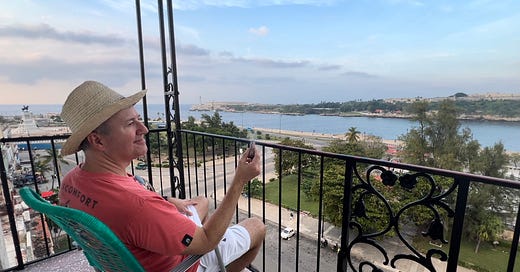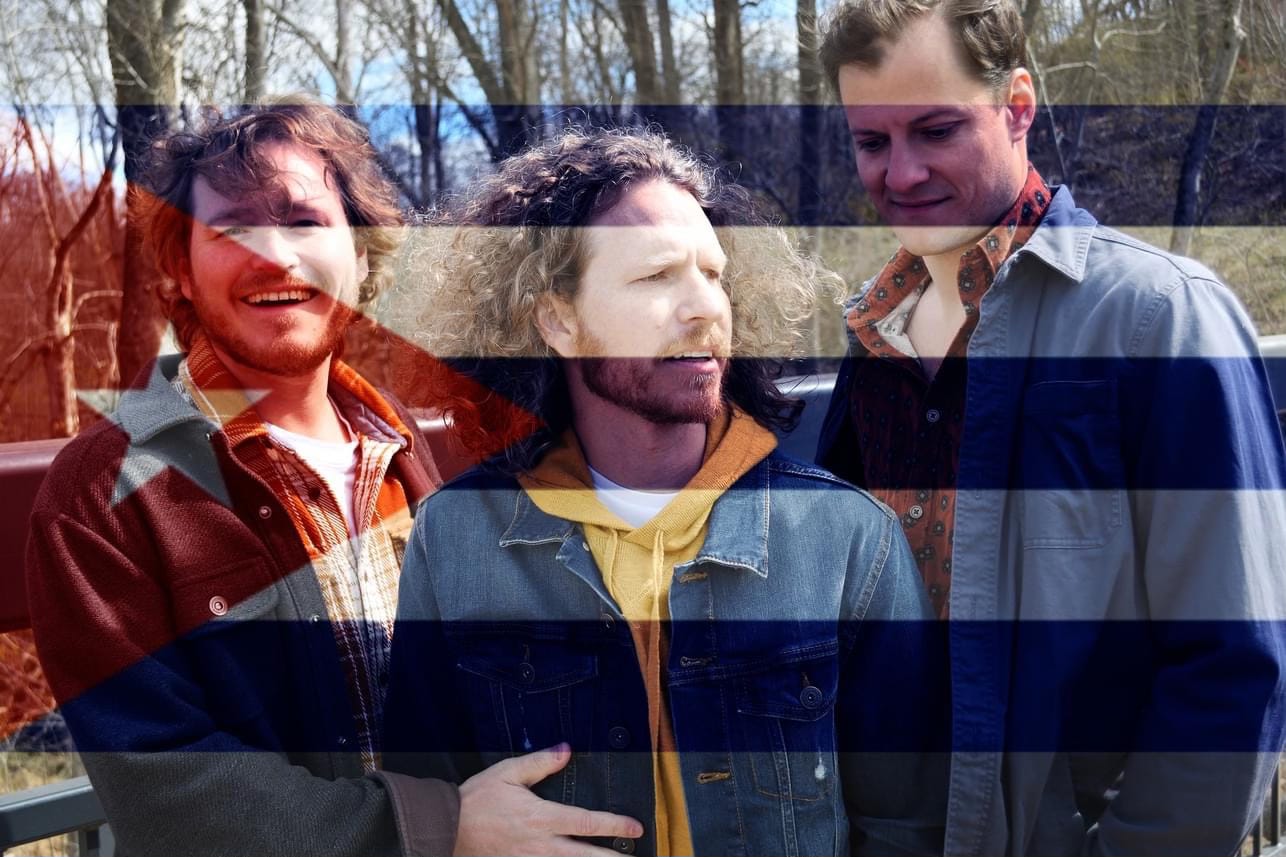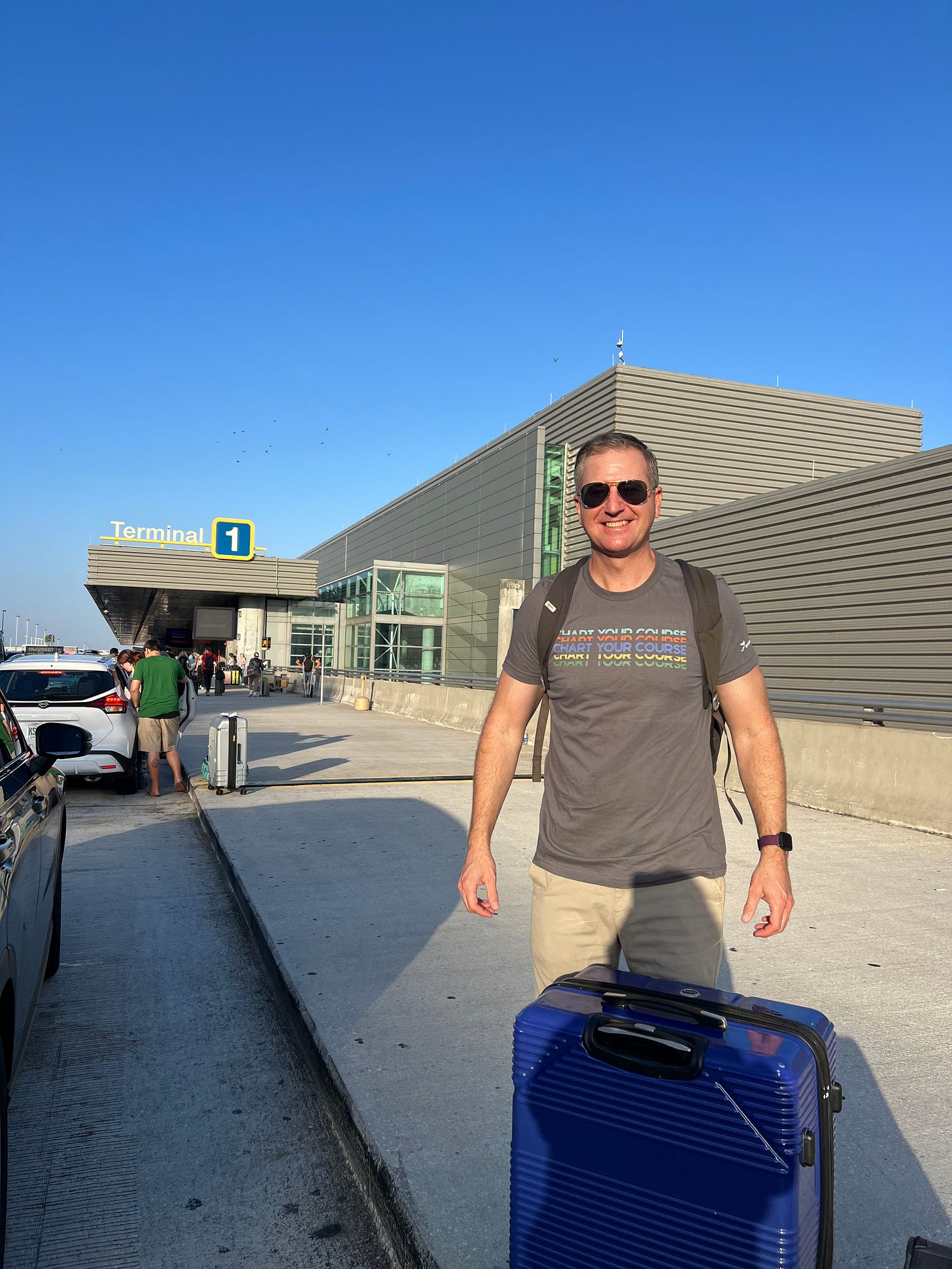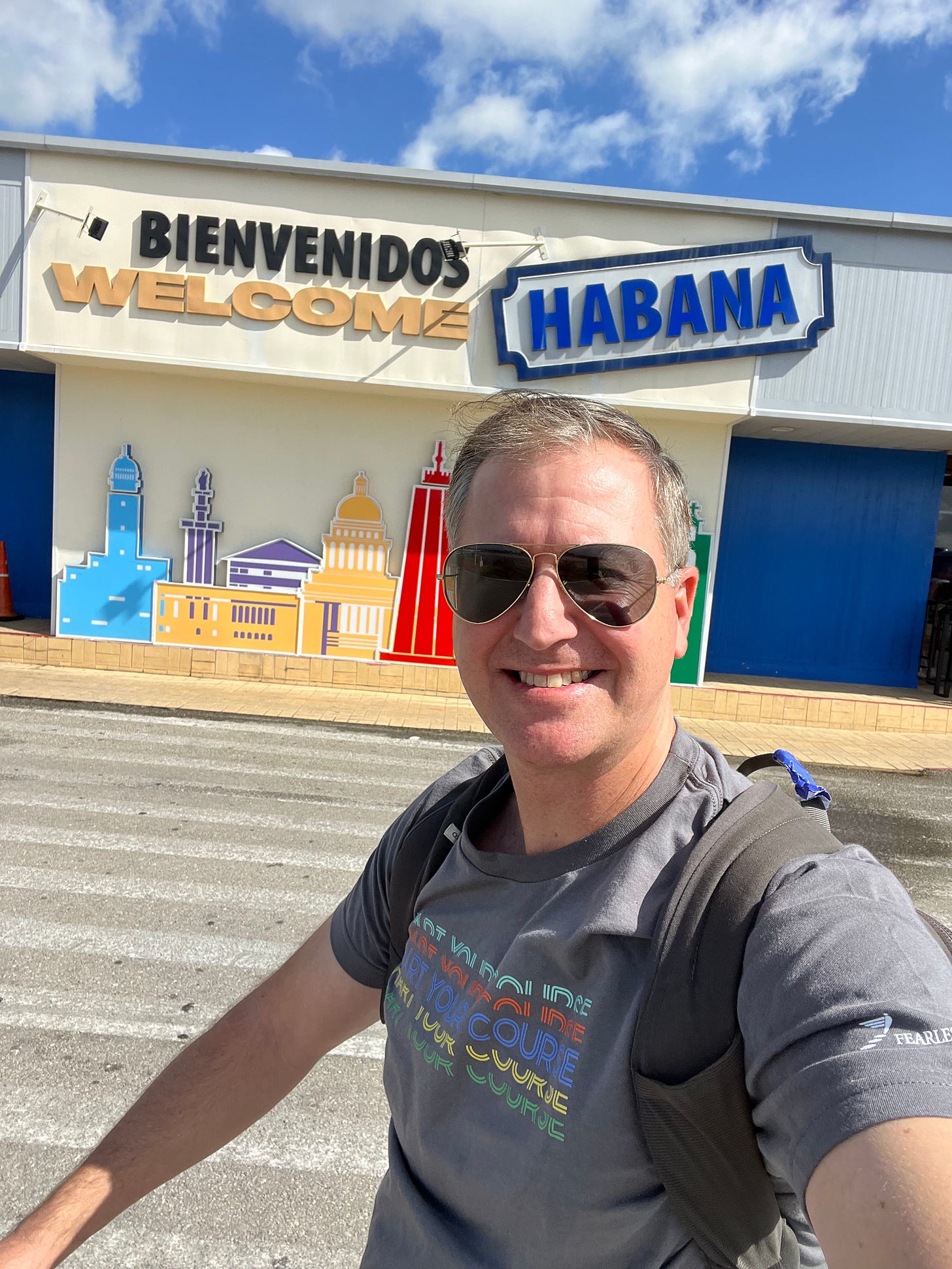Cuba for my birthday
January 13, 2024 was my 46th birthday and I celebrated by going to Cuba -- with The Currys.
January 13, 2024 was my 46th birthday and I celebrated by going to Cuba.
While I organize a lot of group trips for Fearless Journeys, this time around I signed up and paid for a group trip led by someone else.
This group trip was also partially led by my friends, The Currys, a Florida folk band made up of Tommy Curry, Jimmy Curry, and Galen Curry (two brothers and their cousin). I’ve known the Currys since 2015. We met at Rock by the Sea. I had them on my podcast in the fall of 2016, and I even featured a chapter about them in my book, published in 2023. In addition to the great music they create, they are just truly fun and amazing people. Easy to travel with!
The trip was organized by a woman named Joni Ellis, who has a Florida-based nonprofit called Optics for the Tropics. Joni first traveled to Cuba in 2001, for an ornithology conference. Yes, she’s a bird watcher. She was fascinated by her first trip to Cuba then and the many birds that are unique to Cuba. But she was a bit troubled by the fact that most of the bird watchers in Cuba did not have binoculars – which was a true luxury for them, considering all the other priorities most people have in a place of many hardships. So that’s where she developed the nonprofit, Optics for the Tropics, to help bring binoculars to people in Cuba.
A few years later, she started organizing group trips to Cuba, particularly for bird watchers. I didn’t know Joni before this trip but learned she lives in Gainesville, a place The Currys visit often. She has seen them perform there many times. Joni and The Currys came up with an idea for them to join her on one of her trips to Cuba and to invite some of their biggest fans to come too.
Last summer, I saw them promote this trip. But what stood out to me immediately was the date the trip was to set to begin on: January 13th (my birthday). I had to sign up. After all, my father and grandparents are from Cuba. It’s a place I’ve been itching to get to more recently (after avoiding it my entire life, for many reasons).
Cuba is the 29th sovereign nation I have now visited on this planet. But it may be the most special, impactful, and weirdest trip I’ve ever taken. In fact, a few days after returning, I am still processing it all.
Over 63 years ago (September 1960), my grandparents left Cuba. They didn’t want to. It was their homeland. But after Fidel Castro’s “revolution” suppressed so many freedoms, they felt obligated to leave after experiencing Castro’s Cuba for just 21 months.
They were among the very earliest of Cubans to flee Cuba for the freedom of the United States of America. Millions more would follow. In 1960, they took with them their 7-year-old son (my dad) and 4-year-old son (my uncle).
As I sat at the gate at the Fort Lauderdale airport — on my birthday, January 13 — to board my plane on Southwest Airlines, a lot of emotions poured over me suddenly. I was thinking about my grandparents, who are in heaven now. They never made it back to Cuba since they left in 1960. My grandfather passed away in 2009 and my grandmother in 2020.
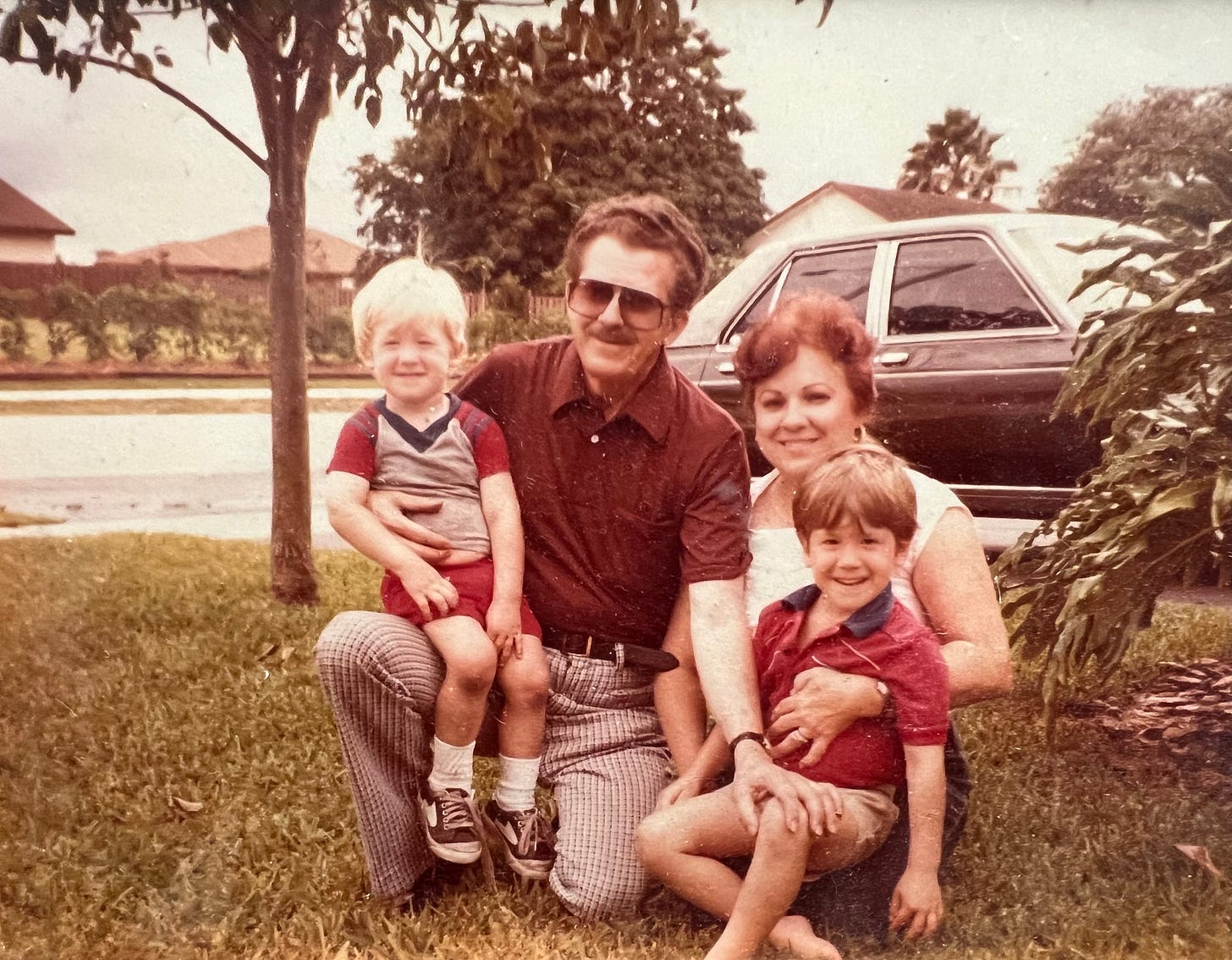
Out of the blue, I started crying, with tears flooding down my face. I was thinking about all the times I talked with them about their experiences in Cuba and leaving Cuba. I began thinking about how painful that fearless journey was for them and all the unknowns that lay ahead for them and their two small children, in a country where they did not know the language, and never really did until the day they died.
They sacrificed many things to come here, to the United States, and worked extremely hard for many years, in both New York and Miami, so their children and ultimately their grandchildren (me, being their first) could have every opportunity possible.
Today, because of the risk they took, my opportunities are so vast that I was able to check in for my Southwest Airlines flight from my home airport of Fort Lauderdale to the place they left 63 years ago: Havana, Cuba. And now, I would be celebrating my birthday in the very city where my father was born but has not yet returned to after he left at the age of 7, in September 1960.
When my grandparents left Cuba for the United States, they brought with them only their suitcases. Now, on this day of my departure the other way, I had with me a backpack, a carry-on bag, and a checked bag that included an entire suitcase of clothing donations to support the people of Cuba. I did not bring that suitcase back to the United States when I returned home this past Saturday. In a sense, I feel like I was returning their suitcase (albeit a different one, physically), back to Cuba.
The United States government has had a longstanding embargo of Cuba, to punish the Cuban government for allying with communist Soviet Union during a prolonged Cold War — that included the Cuban missile crisis. Our government has continued to punish the Cuban government for so many of the human rights abuses that continue to this day and for the lack of free elections since “the Revolution” began. However, while punishing the government, we also add suffering to the people too.
It’s important for us all to remember that from the 1960s to the early 1990s, Cuba was closed by the Cuban government. Cubans couldn’t get out freely (they had to escape) and no one was allowed in – much in the same way the Soviet Union constructed the Berlin Wall, not to allow anyone to cross in or out of the USSR and its various satellite nations. Authoritarian regimes don’t want you freely peeking into their hellhole.
But in the 1990s, after the fall of the USSR, the Cuban government no longer had their support. They had to do something to survive. And, at the time that so many other nations were breaking the chains of communism, many wondered if Cuba would be the next domino to fall.
The 1990s became known as “the special period” in Cuba, in which their government attempted the unthinkable: a little dose of capitalism. They started building hotels for tourists. Europeans and Canadians started visiting. This is where the U.S. embargo really became weighted on the U.S. side: we didn’t allow Americans to travel there legally.
During the administration of Barack Obama (between 2009 and 2017), some parts of the U.S. embargo were lifted, allowing Americans to travel there for special reasons and also for tourism. Cruise ships started going there. In 2016, President Obama also became the first U.S. President to visit the island in almost 90 years.
While the Trump administration allowed this loosened policy toward Cuba to stay in place for a bit, they later reinforced sanctions against Cuba, mostly because of Cuba’s support of other authoritarian regimes, including Venezuela. Those restrictions have remained in place during the current Biden administration.
While I was in Cuba, I learned that during the time we allowed Americans to cruise to Cuba, about 9,000 passengers were getting off cruise ships in Havana almost daily. As of summer 2019, that has since gone away, and it adversely affected so many Cubans who had started to economically depend on those tourists spending money on their entrepreneurial activities.
Then, COVID hit in 2020. If you think the supply chain was slowed down in the free world, it really did in Cuba. And if you think our economies were affected, imagine how all this affected the Cuban people.
In 2021, the economic hardships led to political unrest in Cuba. Thousands of people took to the streets to protest the government. They wanted change. They started tweeting #SOSCuba. No one outside the island came to their aid and the Cuban government shut down internet access for a while.
These actions made me question whether I should visit Cuba anytime soon.
That is … until The Currys decided to partner with Joni and launch a trip there on my birthday on January 13, 2024. With crazy things happening around the world – from Ukraine to Israel -- I felt like I did not want to miss this opening. You never know when things could change again. This was my chance. And I took it!
Now that I have returned back to the United States, after an incredible one-week experience in Cuba, I can say with absolute certainty, I am glad I took the opportunity. And I am even more convinced that the United States needs to lift the travel ban to Cuba. There is no reason that our government should be getting in the way of our freedom to travel there, should we wish to.
Every Cuban person I met, that I can remember, spoke highly about the United States. Almost every Cuban I met on the street, and through our various planned experiences, has family living either in the U.S. or somewhere else abroad. Some want to stay in Cuba. They love their country and their homeland. Others are looking for a way out and are already in the process of going through the very complicated U.S. immigration system.
All have access to the internet. They know about the world outside Cuba. Some have traveled to the U.S. and Europe and returned to Cuba. I was quite surprised how many spoke so openly about their own opinions. While I am sure they wouldn’t be publishing those opinions in the local newspaper, they did seem free to give them to me, someone they just met.
I hope that my first trip to Cuba will be one of many in the future. I also hope now that I have been and seen how safe it is and how comfortable I felt there, despite their true lack of resources, that it will pave the way for my father and other members of my family to feel comfortable going back with me. Perhaps I’ll lead group trips there of my own in the future. We shall see. If this interests you, please drop me a line.
I hope one day we can all be part of bringing the two nations of Cuba and the United States back together again. We were once great friends and allies. We helped Cuba secure their independence from Spain in 1898. The island was a U.S. protectorate from 1898-1932. Americans built hundreds of schools for Cuba and U.S. universities even took in hundreds of Cubans on scholarship during the early 20th century.
From the 1930s to the 1950s, Cuba was “the Vegas before Vegas” and Americans visited frequently. The drink, “the Cuba Libre” otherwise known as “rum and coke” was invented as a collaboration between Cubans and Americans during the Cuban war for independence.
One of the most famous American writers, Ernest Hemingway, was virtually adopted by Cuba, a place he made his home – a home I was able to visit during my trip.
When I flew to Cuba, I could not believe how truly close it is.
My plane took off westward bound from Fort Lauderdale at 10:54 AM. We flew over Broward and Miami-Dade counties and hugged the coast of the Florida Keys, which I could see from my right-side window seat.
At 11:22 AM, we flew right past Key West. Just three minutes later, I could feel our plane starting to descend toward Havana.
As I looked at the waters below, I envisioned my grandmother, my 7-year-old dad, and 4-year-old uncle taking that ferry from Havana to Florida in September 1960 — in those very waters. My grandfather had to take a separate boat to Mexico and fly to Miami to meet them. I also thought about the many Cubans who have taken to those same waters in rafts, only to perish while they attempted to escape towards their own freedom.
At 11:30 AM, I was seeing a lot of cargo ships and maybe even a cruise ship, making their way toward Cuba. Five minutes later, I got my first sight of the Cuban coast from just a few thousand feet up.
At 11:44 AM, we were not only flying over the beautiful Cuban countryside (which is very green!), but now we were getting close to Havana, where I could see the buildings and skyline right along the coast.
At 11:48 AM, we touched down in Cuba! Only 9 minutes later, I disembarked from the plane. They don’t have a jetway. You get off on the tarmac. How special this was to touch Cuban land – only one hour after my flight had departed from Fort Lauderdale.
On the way home the following week, the flight left Havana and touched down in Fort Lauderdale only 44 minutes later. How crazy close are these two nations? Yet how far they have been apart for far too long.
As I said above, I hope we can be part of bringing these two nations together again. It won’t happen through the governments of sovereign nations – the past 64 years of horrible policies on both sides of these waters has proven that.
Instead, the unity will take place through sovereign individuals. And that’s part of the reason we came here – to support the Cuban people. We took donations. We took music. And we received much more love in return.
In my future posts, I am going to write more about so many of our incredible experiences. I hope you’ll follow along.

